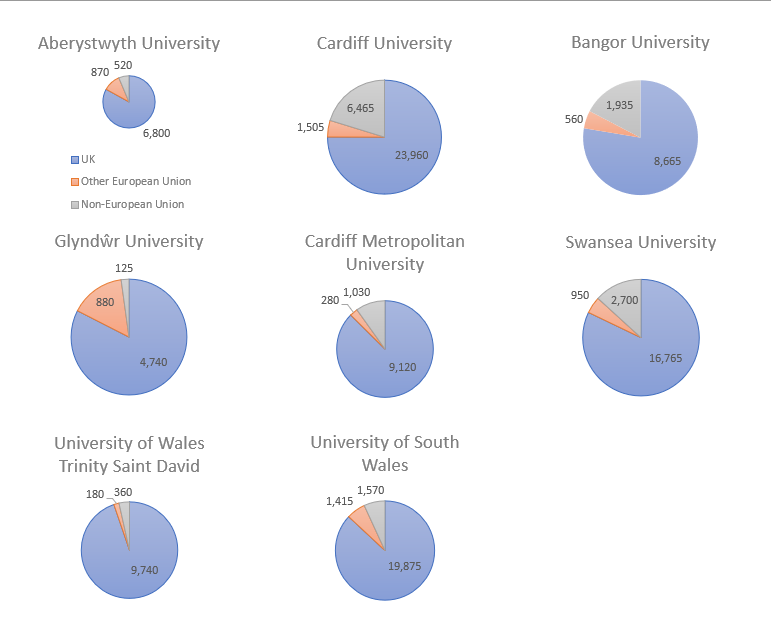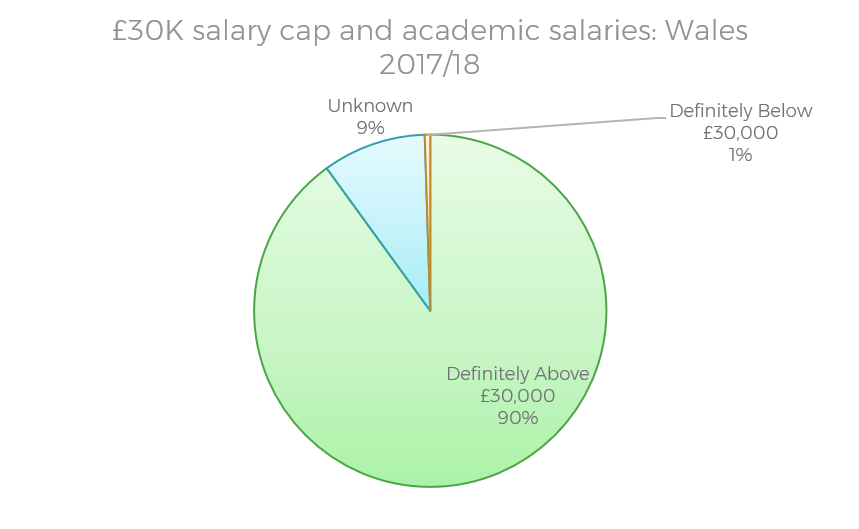The Children, Young People and Education Committee’s December 2018 report, Degrees of Separation, looks at the potential impact of Brexit on higher and further education in Wales.
It is being debated in Plenary on 20 March 2019.
This blog post provides the latest information on some key matters raised within the report. It reflects the situation on the morning of 19 March 2019.
What did the report recommend?
The report makes twelve recommendations across the 8 key issues that emerged from the evidence taken by the Committee from May to July 2018.
Key recommendations include:
- Welsh Government demanding via, the then still to be introduced UK immigration Bill, executive powers for Welsh Ministers to set different immigration rules specifically for students and staff coming to work and study in Wales (this is not the same as asking for competency over immigration);
- Welsh Government working with the higher and further education sectors to put in place and test funding arrangements that would guarantee no financial disruption to ERASMUS+ students, particularly those relying on the placements for their foreign language degrees; and
- Welsh Government committing to working with the further education sector to jointly develop and publish a plan, funded by a EU Transition Fund bid that identifies and responds to any changing skills demands in those sectors most likely to experience Brexit related disruption.
All the recommendations can be found here [PDF: 720KB], and the Welsh Government’s response can be found here [PDF: 203KB].
The Committee has written to the Minister for Education [PDF: 158KB] to ask for clarification on some parts of Welsh Government’s response to the report, wrote to the Minister for Education [PDF:158KB] asking for more information. The Minister’s letter providing additional information can be found here.
Bringing you up to date on key areas
The remainder of this blog briefly explores three key areas from the report:
- Student and staff immigration;
- Significant EU programmes (ERASMUS+ and Horizon)
- Meeting industry skills demands after Brexit
Staff and students, and repealing free movement
Since the publication of the report, the UK Government has published its White Paper consulting on the UKs future immigration system, and introduced the Immigration and Social Security Co-ordination (EU Withdrawal) Bill.
The Bill would give the Secretary of State the power to repeal free movement law in the UK on a day appointed by regulations.
This means that freedom of movement need not be ended immediately on Brexit.
The UK Government’s intention appears to be not to immediately repeal free movement as a result of a deal (because of the transition period) nor as a result of a no-deal scenario (where there’d be an “interim period” of free movement).
Repeal of free movement will mean that EU staff and students coming to the UK would need to gain specific permission to study or work in the UK. The White Paper explains that
Everyone will be required to obtain a permission if they want to come to the UK and to work of study here
The new skills-based immigration system from 01 January 2021
The Bill itself does not set out the skills-based post-transition period immigration system – this will be set out in the Immigration Rules that most non-EU migrants come under at the moment.
UK Government currently intends for this new system to come into force from 01 January 2021.
Contained within the Immigration Rules is the Points-Based System that the UK Government is proposing to extend to all almost migrants. This would mean that EU students would eventually need to gain a Tier 4 student visa to study in the UK, and staff likely a Tier 2 visa.
Tier 4 visas currently have clear requirements that applicants must meet including needing to have an offer from a university, having sufficient maintenance funds and they come with restrictions on working rights.
In the event of a no-deal, students (and staff) arriving after the temporary interim period before freedom of movement is repealed would need to apply for European Temporary Leave to Remain if they wanted to remain in the UK for more than three months.
In 2017/18 there were 6,640 EU student enrolments at Welsh higher education providers (some 5% of total enrolments at providers in Wales). The graphic below shows how they are spread across Wales’ universities.
The Migration Advisory Committee report which has informed the UK Government’s immigration White Paper recommends a minimum salary threshold for Tier 2 visa applicants of £30,000.
The graphic below shows how such a threshold would interact with the contracted salaries of academics employed by Welsh universities in 2017/18.
Welsh Government in its response to the Committee’s report states that it will engage with the UK Government’s immigration White Paper. Its additional response makes it clearer that Welsh Government policy is to only seek different immigration rules if the UK Government “persists in a policy which we believe to be damaging to our interests, we would [then] welcome a spatially differentiated approach”.
ERASMUS+ and Horizon Europe
The Political Declaration on the future relationship between the UK and EU highlights a willingness to enable the UK to participate in EU programmes on science and innovation, youth, culture and education, meaning that Universities might still be able to participate in ERASMUS+ and Horizon Europe after Brexit subject to ‘fair and appropriate financial contribution’. Such cooperation would be in line with the UK Government’s proposals in its White Paper on the Future Relationship with the European Union.
However, ambitions to remain associated with Horizon Europe and ERASMUS+ may become uncertain in the event of a no-deal.
The latest version of the UK Government’s no-deal notice on ERASMUS+ states that its no-deal funding guarantee applies only to those ERASMUS+ applications that have a successful decision made prior to 29 March 2019.
At the same whilst the EU Commission has proposed measures that would allow all those who began their mobility prior to 30 March 2019 to complete it without interruption for a period up to 12 months in the event of no-deal.
In the event of a no-deal, universities would no longer be able to access Horizon 2020 research funding, with the UK Government stating it ‘will guarantee funding for competitively bid for EU projects submitted before we leave the EU, including Horizon 2020 projects’.
In 2016/17 (the latest available consolidated figures) [PDF: 405KB] EU funding accounted for for almost a fifth (18%) of all Welsh university research and contract income.
Welsh Government, in its response to the report does not explicitly set out if it has made, or is satisfied institutions have made, arrangements to meet or mitigate any short-term shortfalls in the UK Government’s ERASMUS+ guarantee in the event of a no-deal Brexit.
Meeting skills demands after Brexit
The Committee’s report also found that further education colleges, whilst not having the same number of international students and staff as higher education providers, were particularly sensitive to the strength and make-up of their local and regional economies.
Whilst the UK Government’s EU Settlement Scheme and EU Temporary Leave to Remain scheme may have reduced the prospect of rapid population shifts, the percentage of EU workers in Wales with low and low-middle skill levels is 63% compared to 48% for UK workers.
With Welsh Government skills policy seeking to focus on funding high-level qualifications for high quality careers, a need to respond to increasing replacement demand at lower skill levels could impact these aims.
Welsh Government, in its response to the report, sets out that officials are preparing proposals for skills projects funded by the EU transition fund and that the future skills system in Wales will be “demand led”.
Conclusion
Outside of the political uncertainty surrounding the Brexit process, a picture has emerged of the potential impact of the proposed UK-EU Brexit deal for higher and further education.
Both an agreed Brexit (if the proposed agreement is accepted by the UK Parliament) and a no-deal Brexit will, under current plans, result in significant changes to how EU staff and students come to, and study in Wales as part of a more restrictive future immigration system. For other key higher and further education areas, the political uncertainty around the Brexit process is driving considerable uncertainty for universities and colleges.
Article by Phil Boshier, Senedd Research, National Assembly for Wales
Photo: Inner yard of Archiginnasio of Bologna - one of the most important buildings in Bologna and was once the main building of the city’s University. The Bologna Process is a series of ministerial meetings and agreements between 48 European states which aim to ensure comparability in the standards and quality of higher-education qualifications. These countries implement reforms on the basis of common key values – such as freedom of expression, autonomy for institutions, independent students unions, academic freedom, free movement of students and staff. It is named after the University of Bologna, where the Bologna declaration was signed in 1999.








